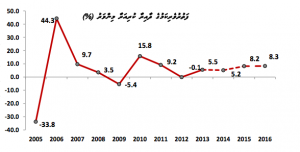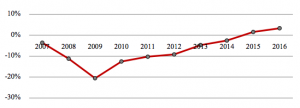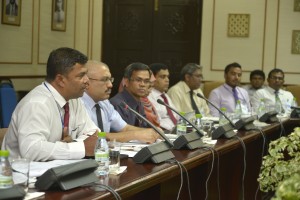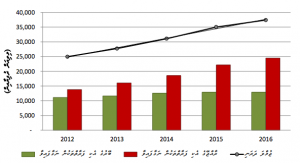Mohamed Waheed’s government has been eyeing Ibrahim Nasir International Airport (INIA) just like a hawk circles around its prey before going for the kill.
Ever since MACL took over the airport from GMR, Waheed has been coming up with one scheme after the other to somehow move assets and ownership of INIA. Whenever such changes in ownership of valuable assets occur, a number of people invariably end up making a lot of money during the process.
First, he changed the MACL board and filled it with his political cronies in order to gain total control over the goings-on at INIA. Then, he tried to move all the assets of MACL into another company created through a secret Presidential decree so that it became a shell company, with all the value pulled into the new company.
This failed due to a number of legal issues. But now Waheed has now decided to sell shares in MACL to ‘Maldivian individuals and companies’ directly.
I will count eight reasons why I believe this proposed sale of MACL shares to ‘Maldivian companies and Maldivian individuals’ makes no sense and may potentially be a big scam-in-the-making.
1. Maintaining economic sovereignty or undermining it?
One reason Waheed’s spokesperson gave for this action was to “prevent foreigners from owning the airport in the future and protect the sovereignty of the airport”.
Essentially, rather than keeping control of MACL’s shares with it and hence ensuring the stated objective, it wants to sell these shares to third parties who can then go ahead and sell their holdings to foreigners. You can see the irony in the very argument that Waheed government is making for selling shares in MACL and wants us to lap up. Clearly, they believe that an average Maldivian on the street is silly and will happily agree to anything thrown his way as long as its wrapped with terms like ‘foreigner’, ‘sovereignty’ or ‘enslavement’.
On the contrary, by selling shares to Maldivian individuals and companies Waheed’s government is in fact opening doors for foreigners to actually go ahead and own INIA in the future.
Currently, the secondary financial markets in the Maldives are practically non-existent and it is easy for shares to change hands in off-market transactions. The regulatory framework for share sale & purchase is rudimentary and fails to ensure that equity shares of a company are not effectively transferred to a foreign entity. In fact, Waheed hailed the sale of two sea plane operators to American investment firm Blackstone as a shining example of how he has been able to bring investments into the Maldives. However, these transactions were an equity share sale of two businesses that are at the centre of Maldivian tourism, to foreign companies.
As a result of this share sale, significant control over Maldivian air space as well as businesses that are central to the health of Maldives tourism was given to an American investor. We have already heard of the problems most resorts are facing with the two sea plane operators and how they are being arm-twisted into signing long term agreements on unfavourable terms.
What will stop a foreign investor like Blackstone buying equity shares in MACL from a bunch of individual or large investors, and ultimately becoming the owner of INIA? In reality, it is this proposed sale of shares in MACL that is the start of potential ‘economic enslavement’ rather than a measure to stop the same in the future!
2. An economic necessity?
One argument that could have possibly been put forward by more aware and informed politicians would have been that this share sale is intended to plug the huge gap in the country’s financial position.
All of us know very well about the grave financial situation that the country and the government is in right now. After exhausting all of the recurrent expenditure budget for the year in the first four months, Waheed’s government has been relying on rolling over T-bills to finance its day-to-day expenses. However, it has already ruled out a supplementary budget for finance these expenditures and stated that it would continue to roll-over these T-bills in the short term. In this context, such a significant decision on divestment of state asset to private individuals is clearly neither a part of the government’s strategy to finance its projects and daily expenditures, nor an economic necessity in the current context.
3. All in the course of seven days
When Nasheed’s government privatised the airport, it put up the airport through an international bidding process managed by the World Bank’s International Finance Corporation (IFC). Work on the privatisation started in July 2009 and finished through announcement of the winning bidder in June 2010. Hence, it took 11 months for the previous government to complete a financial transaction related to the airport.
There were many allegations of corruption around the way the process was managed, which were later ridiculed by the Anti-Corruption Commission (ACC). Now, we have a situation where those who alleged financial irregularities in an 11-month long international bid process are looking to sell shares in the same company over the course of one week!
Even if one were to not compare this plan of share sale to local companies and individuals with the previous bidding process, a share sale like this typically takes more than a year for most companies to complete. Planning and execution of a public offering in most cases is a 6 to 12 month process at the minimum in most countries with well-developed regulations and mature financial markets.
However, here we have a case where an outgoing government wants to complete a public sale of shares of the most valuable national asset in a week. Quite clearly, there is much more to this share sale than meets the eye, which is why it may be important to finish the whole process in the blink of an eye.
4. Eerie silence on the valuation of shares or lack of it
Waheed’s government has given no indication at all of the proposed valuation of MACL and the price at which it is planning to sell the shares. Fair valuation of a share is a matter of opinion and a matter of sound professional judgement of bankers who typically assist with share sales. There are no investment banks in the Maldives who could assist with the sale of shares and no research houses which could come out with an investment report for the public to determine whether the determined price of MACL shares is fair value or not. If a share sale has to be conducted, such experts would typically have to be brought in from other countries such as India, Singapore and Malaysia which have developed financial markets.
GMR made a claim of US$1.4 billion for the loss of profits that it would have earned in the next 10 years, which it couldn’t due to the alleged illegal termination of its contract by Waheed government. Equity shares in MACL would entitle one to profits from INIA for the course of eternity. Hence, what we are looking at is a multi-billion dollar financial transaction – 40 percent of this is also going to represent hundreds of millions of dollars, if not billions.
In this context, the fact that no one in the government has made any statement about engaging an international bank or an expert to help determine the fair value of MACL shares is a clear giveaway. There has been no attempt to find out what would be the fair value of MACL shares, and the intention is to sell these to Maldivian companies and individuals in the matter of a week. One can only deduce from all this that the price (likely to be peanuts) and the buyers of MACL shares have already been decided, and what is proposed to be undertaken over the course of next is a likely to be big sham.
5. Waheed’s moral and constitutional authority to make this decision
Waheed’s term is coming to an end on November 11 and as this column goes to press, efforts are still ongoing to ensure that a new President is put in power by then. Clearly, this is a significant economic policy decision which must be taken by the new President in line with his announced economic policy, based on which he would have been voted into power. Waheed was never voted into power and his manifesto was given a big thumbs-down in the first round election where he received only 5.13 percent of the votes. Clearly, he doesn’t have the moral authority to make such a significant economic policy decision one month before he is scheduled to hand over power to his successor.
As far as constitutional authority is concerned, your guess is as good as mine. With much larger constitutional questions open for debate today, I wouldn’t dare comment on this but I would certainly be surprised if it allows an outgoing President to make such significant economic decisions that have long term economic impact on the state of the nation.
6. A thick cloud of secrecy
What is most important is to understand whether he plans to bypass the Majlis for undertaking this transaction. It was Waheed and his current and former allies who raised their voices against how the GMR concession was awarded without Majlis approval. In fact, this is the legal reason that Azima Shakoor cited as the basis for declaring the GMR contract void ab-initio.
Now that the Waheed government wants to go ahead with share sale in MACL, has he sought or planned to seek Majlis approval for this? He doesn’t have majority in the Majlis now since DRP and MDP have joined hands and this proposal is likely to be shot down given the lack of any ground work as well as his own unpopularity with majority of the Majlis.
Leaving aside Majlis approval, it is not even clear if the majority of the MACL board has passed a resolution authorising any such sale or shares. There are only two statements made by members of the government till now in this regard – by Finance Minister Abdulla Jihad confirming that “40 percent of the shares will be sold to Maldivian public and Maldivian companies as soon as possible” and by the President’s Office confirming the intent of this sale in the next seven days.
MACL CEO Bandhu Saleem has deflected all questions to the Minister of Finance, who has in turn deflected all the detail related questions to the Attorney General. The Attorney General has not spoken on this in public till date, let alone answered any questions in this regard.
7. An ill-timed transaction that suits vested interests
The Maldives is burning today – literally so with Monday morning’s arson attack on the pro-opposition media house Raajje TV. Protests are taking place every day and every night on the streets of Male’ calling for elections as scheduled and for restoration of the basic constitutional right to vote. Credibility of the Supreme Court and other state institutions is under the scanner and the country is almost in a state of constitutional void.
Whichever way one looks, the political environment couldn’t have been more ill-suited for carrying out one of the most significant multi-million dollar economic transaction, of a public asset, in the history of the Maldives.
However, this is also the reason why it is the most suited for a malafide transaction since the national agenda is dominated by fears for the future of democracy. This provides the perfect opportunity for undertaking the most outrageous looting of a national asset and sweeping it under the carpet. Public memory is too short to remember this for long and too preoccupied right now to notice anything else.
8. More of the same game that has been played a few times over the last one and a half years
During Waheed’s tenure over the last 1.5 years, his Transport Minister signed a 99-year lease extension for Mamigili Airport in favour of his political boss Gasim Ibrahim. On the face of it, the minister was fired but the decision was never reversed. The loss that this ad-hoc extension may have caused to the exchequer was never quantified and never spoken about in public.
Under Waheed’s tenure, KASA Holdings owned by ‘Champa’ Afeef bought 30 percent of Addu International Airport for ~US$4 million, thereby valuing Gan Airport at close to US$13 million. This was a private transaction of a public asset and was done under utmost secrecy with news of the sale given only afterwards in a press briefing by STO’s Managing Director Shahid Ali. There was no justification, no clarification and no questions asked or answered with respect to this private sale of a public asset. It is not even known till date whether the company was even valued higher than the scrap value of its assets.
A very rushed-up transaction, no discussion or record of economic merit, bypassing the Majlis and an eerie silence about the transaction until it is completed have all been fundamental to the modus-operandi till date.
Clearly, this sale of shares in MACL is more of the same game that has been played again and again under Waheed government.
Summing up, this is about to be the biggest looting ever done in the Maldives and it is happening right now in front our very own eyes, orchestrated by a man none of us ever elected and 95 percent have rejected less than a month ago.
All comment pieces are the sole view of the author and do not reflect the editorial policy of Minivan News. If you would like to write an opinion piece, please send proposals to [email protected]
Likes (0)Dislikes
(0)Dislikes (0)
(0) 


